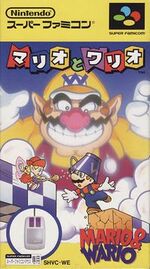| Site Notice |
|---|
|
We have a limited coverage policy. Please check our coverage page to see which articles are allowed. |
Difference between revisions of "Mario & Wario"
m |
(→References) |
||
| (5 intermediate revisions by 3 users not shown) | |||
| Line 5: | Line 5: | ||
|jptranslation=Mario to Wario | |jptranslation=Mario to Wario | ||
|jptrans= | |jptrans= | ||
| − | |boxart= | + | |boxart=Mario and Wario Box Art.jpg |
|imgsize=150px | |imgsize=150px | ||
|caption= The box art of Mario & Wario. | |caption= The box art of Mario & Wario. | ||
| Line 19: | Line 19: | ||
|colorscheme=Mario | |colorscheme=Mario | ||
}} | }} | ||
| − | '''''Mario & Wario''''' is a puzzle game released in 1993 for the [[Super Nintendo Entertainment System|Super Famicom]], exclusively in Japan. The game makes extensive use of the [[SNES Mouse]] accessory. | + | '''''Mario & Wario''''' is a puzzle game released in 1993 for the [[Super Nintendo Entertainment System|Super Famicom]], exclusively in Japan. Although the game was only released in Japan, the game itself (outside of the box art and manual, inserts) is entirely in English (a similar case to [[Undake30 Same Game Daisakusen Mario Version]]) although [https://tcrf.net/Mario_%26_Wario#Unused%20Title%20Screen a Japanese title-screen remains in the code unused]. |
| + | |||
| + | The game makes extensive use of the [[SNES Mouse]] accessory. Like the original release of [[Mario Paint]], it cannot be played without it. | ||
The game was previewed in ''[[Nintendo Power]]'' magazine, hinting that the game was planned to be released in North America, though it never was.<ref>[http://www.snescentral.com/article.php?id=0921 Snes Central: Mario & Wario]. SNES Central. Retrieved August 9, 2016.</ref> | The game was previewed in ''[[Nintendo Power]]'' magazine, hinting that the game was planned to be released in North America, though it never was.<ref>[http://www.snescentral.com/article.php?id=0921 Snes Central: Mario & Wario]. SNES Central. Retrieved August 9, 2016.</ref> | ||
| Line 32: | Line 34: | ||
{{Game Technical Details | {{Game Technical Details | ||
|media=Super Famicom [[Game Pak]] | |media=Super Famicom [[Game Pak]] | ||
| − | |input=[[ | + | |input=[[Super NES Mouse]] |
}} | }} | ||
| Line 43: | Line 45: | ||
{{-}} | {{-}} | ||
{{Super Mario series}} | {{Super Mario series}} | ||
| + | {{Wario series}} | ||
[[Category:Super Nintendo Entertainment System games]] | [[Category:Super Nintendo Entertainment System games]] | ||
[[Category:1993 games]] | [[Category:1993 games]] | ||
[[Category:Games developed by Game Freak]] | [[Category:Games developed by Game Freak]] | ||
Latest revision as of 23:59, 10 October 2023
| This article is a short summary of Mario & Wario. Super Mario Wiki features a more in-depth article. |
| Mario & Wario | ||||||||||||||
| マリオとワリオ Mario to Wario | ||||||||||||||
| ||||||||||||||
| ||||||||||||||
| ||||||||||||||
|
Mario & Wario is a puzzle game released in 1993 for the Super Famicom, exclusively in Japan. Although the game was only released in Japan, the game itself (outside of the box art and manual, inserts) is entirely in English (a similar case to Undake30 Same Game Daisakusen Mario Version) although a Japanese title-screen remains in the code unused.
The game makes extensive use of the SNES Mouse accessory. Like the original release of Mario Paint, it cannot be played without it.
The game was previewed in Nintendo Power magazine, hinting that the game was planned to be released in North America, though it never was.[1]
Story
Mario, Luigi, Princess Peach, Yoshi head to a set of woods to find the pixie said to live there. However, as they are searching, the group loses Luigi. The three others separate to search for him, but Wario flies overhead and drops a bucket onto Mario's head which he cannot pull off. Wanda, the pixie living in the woods, decides to help Mario find his missing brother.
Gameplay
Players can select between Mario, Peach, or Yoshi when playing the game. Rather than playing as that character directly, the player instead controls Wanda, using the SNES Mouse to guide the character, who has been blinded by a bucket being dropped on their head, through each stage to Luigi, who acts as the goal. Each character has a different walking speed: Peach is the slowest, Yoshi is the fastest, and Mario is average.
Technical details
|
External links
References
- ↑ Snes Central: Mario & Wario. SNES Central. Retrieved August 9, 2016.
| ||||||
| Related NIWA Wiki |


